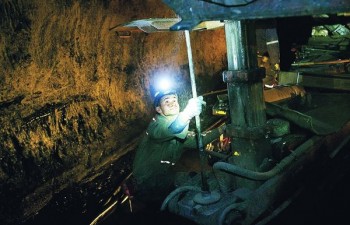
In this Oct. 6 photo, a miner works underground in the Sewell “R” coal mine in Yukon, W.Va.
WHEELNG, W.Va. — West Virginia Coal Association officials believe state leaders must cut the coal severance from 5 percent to 2 percent to avoid “disastrous” consequences, but Gov. Earl Ray Tomblin and legislators believe this could result in annual revenue loss of more than $100 million.
Citing a study by global financial services firm PricewaterhouseCoopers, coal association President Bill Raney and Senior Vice President Chris Hamilton said cutting the severance tax would save 1,864 jobs in the state, while increasing West Virginia’s gross domestic product by $299 million annually.
“The economic study PwC released today demonstrates that quick legislative action on coal severance tax relief can significantly reduce this hemorrhaging of jobs,” Hamilton said. “In other words, if our legislature fails to enact the 3 percent rate cut immediately, these savings would not occur and the consequences would be disastrous.”
West Virginia now charges a 5 percent regular tax rate on coal production, in addition to another 56 cents per ton to help pay off workers’ compensation debt. Tomblin plans to remove the 56-cent tax this year, but coal industry leaders believe this is not enough relief.
Raney cited the 1,500 Worker Adjustment and Retraining Notification Act notices sent to the state’s coal miners over the last few months as evidence that state leaders must do more.
“West Virginia’s excessive coal severance tax is a significant cause of the recent layoffs,” he said, “and it must be reduced immediately to prevent more job loss.”
Wyoming, which is by far the nation’s largest coal producer, charges a 7 percent tax for surface mining coal, but only applies a 3.75-percent rate for coal extracted through underground mining. Kentucky taxes coal at 4.5 percent, while Ohio charges a comparatively small 10 cents per ton.
Maryland collects 15 cents per ton, and Alabama enforces a 34-cent per ton rate. Pennsylvania, Illinois and Indiana currently charge no severance taxes at all for coal production.
Last month, Murray Energy President and CEO Robert E. Murray said a $7.6 million severance tax payment on New Year’s Eve forced him to displace 674 coal miners. During a speech at the coal association’s mining symposium, he called the tax “very high and unfair,” in urging legislators to provide relief.
After a $3.5 billion deal with Consol Energy in late 2013, St. Clairsville-based Murray took control of five West Virginia coal mines, including the former McElroy and Shoemaker mines in the Northern Panhandle.
Coal industry leaders got some reprieve last week when the U.S. Supreme Court voted 5-4 to delay implementation of the Clean Power Plan while court challenges to it are resolved. The 5-4 ruling was issued just days prior to the death of conservative Justice Antonin Scalia, who voted to grant the stay.
As both the selling price of coal and the amount sold have fallen, so have the amounts collected by the West Virginia Department of Revenue. For fiscal year 2012, the state received $420.7 million from the tax. For fiscal year 2015, the amount had fallen to $276.7 million, reflecting a $144 million decline in three years.
Due to this crash in funds, Tomblin does not believe the state can afford such a dramatic cut in severance tax rates, as he is focusing on removing the 56-cent per ton tax.
“In terms of larger cuts being proposed by a number of different groups, the impact on the state budget could be well in excess of $100 million. At a time when the state is already dealing with financial difficulties, additional tax cuts are not something the state can consider at this time,” Tomblin spokeswoman Shayna Varner said. “In addition to the financial impact on the state, a reduced severance tax could have an impact on local revenues for coal producing counties as well.
“Gov. Tomblin understands the difficulties the coal industry is facing,” Varner added.
In addition to Tomblin’s objections to Murray’s plan, Delegates Erikka Storch, R-Ohio, and David Evans, R-Marshall, said such a significant severance tax cut is unlikely to happen.
To read more from The Intelligencer/Wheeling News-Register, subscribe here.





